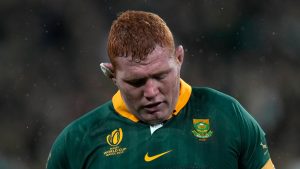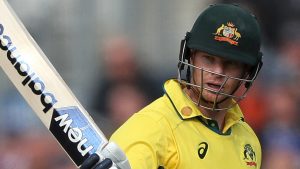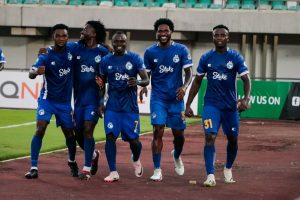Austin Riley, Michael Harris II lead Braves’ new youth movement


By Pedro Moura
FOX Sports MLB Writer
At the start of the 2019 season, the Atlanta Braves signed both Ronald Acuña Jr. and Ozzie Albies, young men born in 1997, to long-term extensions in a 10-day span. It felt like the dawning of a new era.
The Braves had just bounced back from four down seasons to win the 2018 National League East, during Alex Anthopoulos’ first season as general manager. Freddie Freeman, the franchise cornerstone throughout the lull, figured to team with Acuña and Albies in forming what the club hoped could be a perennial winner.
Under Anthopoulos, Atlanta has indeed built a perennial winner, but not in the manner anyone could have expected. Freeman is, obviously, a Dodger, after a saga we need not revisit here. The Braves won the World Series without Acuña a year ago, and, in his 2022 return from a torn ACL, he has been only good, not great. Albies has been merely average for three seasons now, and mediocre when healthy this year.
Ronald Acuña Jr.’s impact on Braves, MLB
Ben Verlander analyzes the impact that Ronald Acuña Jr. has had on the Atlanta Braves and how he continues to bring new fans to MLB.
Rather, the Braves are winning because of a new, emergent crop of homegrown talent. In an unexpected development, third baseman Austin RIley, another 1997 child, has arrived as a superstar. When Albies and Acuña signed their extensions, Riley was still a prospect at Triple-A Gwinnett. He debuted the next month but played below-replacement baseball for the ensuing two seasons.
A month into the 2021 season, Riley started hitting at a higher clip. His improved patience forced pitchers to attack him in the zone, and he seized on strikes. Within the past month, Riley made his first All-Star Game and signed his own extension — worth $212 million, or more than 50% more than Albies and Acuña’s deals, together.
Riley is now, as much as anyone, the face of Atlanta’s franchise.
Beyond Riley, the Braves are relying on a player so young that he was not in their organization when Albies and Acuña’s contracts were finalized. Center fielder Michael Harris II, born in 2001, became the youngest major-leaguer when he debuted over Memorial Day weekend. Atlanta had drafted the hometown product in the third round in 2019. Because of the 2020 pandemic shutdown, he hardly played professionally until 2021. The Braves promoted him after his 43rd game at Double-A, a decision so aggressive that it surprised Harris himself, his parents and many around the sport.
The aggressiveness has proved warranted. Harris is the true center fielder the Braves have long lacked, making their defense much more imposing. He doesn’t walk much but makes enough contact to utilize his speed. He is also producing more power than he managed in the minors. By Wins Above Replacement measurements, he has been about as valuable to the Braves this season as Acuña and Albies combined.
Last week, the Braves made another aggressive promotion decision: They called up Harris’ close friend, and fellow 2019 draftee, Vaughn Grissom, to man second base while Albies and replacement Orlando Arcia remain out due to injury. With Tampa Bay‘s Wander Franco currently hurt, Grissom trails only Harris as the sport’s second-youngest active player.
In addition to a short-term positional patch, Grissom’s stint could also amount to a test run regarding his readiness to replace impending free-agent shortstop Dansby Swanson next season. Grissom debuted in storied fashion, homering over Fenway Park’s Green Monster for his first hit. Afterward, he embraced Harris.
“It was like a ‘We made it’ moment, I guess,” Grissom told reporters in Boston. “Like, a ‘We did it’ type of feeling.”
Atlanta’s Michael Harris II & Spencer Strider highlight top rookies
In June, Ben Verlander spotlighted Michael Harris II in his Head of the Class segment featuring MLB’s top rookies.
The two 21-year-olds are joined in the lineup nightly by another player who arrived, indirectly, through recent drafts. In March, the Braves traded four of their better prospects to Oakland for Matt Olson, their chosen Freeman replacement. Atlanta acquired two of those four prospects, including headliner Shea Langeliers, in the 2019 draft, and another in the 2021 edition.
This is not a wholesale changing of the guard for the Braves. Ace left-hander Max Fried predates the 2019 team, and he is under club control for at least two more seasons. Acuña is still only 24, and by no means have his abilities withered. Evaluators expect him to return to prime form in time.
But it is perhaps a shifting, and so far, it is working. The Braves’ 13-1 thrashing of the Mets on Monday was their seventh consecutive win. Atlanta may be too far behind the mighty Mets to prevail in this year’s NL East, but the Braves are a virtual certainty to qualify for postseason play for the fifth consecutive season. And because of apt drafting and speedy player development, they are built to sustain this success. They possess one of the sport’s youngest cores, much of which is under club control at below-market rates for years to come.
That all began in April 2019.
Pedro Moura is the national baseball writer for FOX Sports. He previously covered the Dodgers for three seasons for The Athletic and, before that, the Angels and Dodgers for five seasons for the Orange County Register and L.A. Times. More previously, he covered his alma mater, USC, for ESPNLosAngeles.com. The son of Brazilian immigrants, he grew up in the Southern California suburbs. His first book, “How to Beat a Broken Game,” came out this spring. Follow him on Twitter @pedromoura.
Get more from Major League Baseball Follow your favorites to get information about games, news and more.









